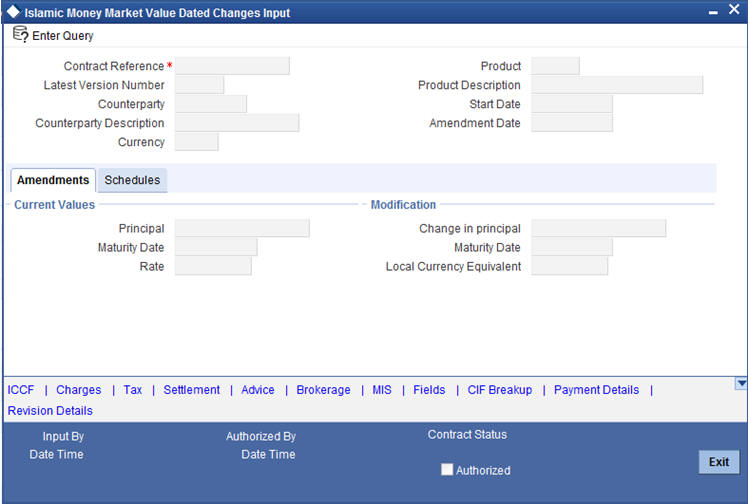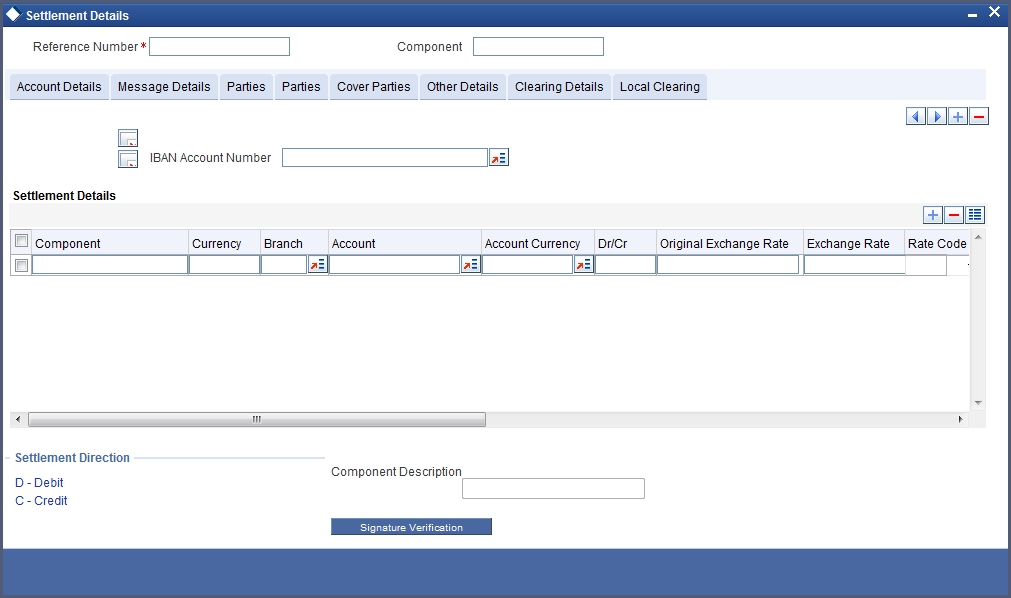6. Making Profit Rate Changes
Any change to the terms of a Murabaha Money Market deal, which affects its financial details and the accounting entries, can be made through the Value Dated Changes function of Oracle FLEXCUBE. Through this function you can make changes to authorized deals on any day before the Maturity Date of the deal.
The changes to the terms of a deal, notified through this function, take effect on a date referred to as the ‘Value Date’. That is why the changes brought about by this function are called Value Dated Changes.
A Value Date could be:
- Today
- A date in the future
- A date in the past
Using the Value Dated Changes function, you can make changes to the various components of a deal like the profit rate or amount. You can also change the Maturity Date and the Credit Line to which the deal is linked.
In addition to changing the values in certain fields, you can enter a value into a field, which was not used, when you captured the disbursement details. For example, you may not have specified a fee at the time of deal input. Using the Value Dated Changes function, you can specify the fee so that the fee entries are passed on the Value Date.
When you make a value dated change, only the accrual entries will be passed by the Value Dated Changes function. All the other accounting entries are passed by the Automatic Contract Update function.
The Value Date is the date on which the changes that are going to be defined will take effect. This can be a date earlier than today, today, or a date in the future.
If the value date is a date in the past, it should not be beyond the following dates for any component:
- Last payment date
- Last schedule date
Also, a value date in the future cannot be beyond the Maturity Date of the deal. If it has to be beyond the Maturity Date of the deal, you have to first postpone the Maturity Date of the deal so that your proposed future value date falls before the new maturity date. Only after this change is authorized can you fix a value date in the future for the deal.
The system defaults to today’s date.
You can invoke ‘Islamic Money Market Value Dated Changes Input’ screen by typing ‘MCDVAMND’ in the field at the top right corner of the Application tool bar and clicking the adjoining arrow button. In the displayed screen, enter the reference number of the deal to which you want to make amendments. The main details of the deal will be displayed in the screen.

This chapter contains the following sections:
- “Navigating to the Schedule Definition Screen” on page 2
- “Settlement Instructions” on page 4
- “Deleting Value Dated Changes” on page 4
- “Uploading the Contracts for Amendment” on page 4
- “Authorization of Changes” on page 6
6.1 Navigating to the Schedule Definition Screen
The schedule changes, which have come about as a result of value-dated changes, can be done through the ‘Murabaha Money Market – Value Added Amendments’ screen. For example, if the schedule change has come about following a change in the maturity date, or the profit rate, you have to do this through this screen. Click on ‘Schedules’ in this screen.
Maturity Date
Enter the new Maturity Date in the screen. When you change the Maturity Date of a deal if:
- You have advanced the Maturity Date, the schedules falling due after the new Maturity Date will be redefined to the Maturity Date
- You have postponed the Maturity Date, the schedules that have not been liquidated and which fall due before the new maturity Date will be redefined to the new Maturity Date
You have to authorize the change in Maturity Date, before you redefine the schedules as per your new requirements, through the Contract Schedules screen.
When you extend the Maturity Date of a deal, the time code of the credit line to which the deal is linked should be beyond the new Maturity Date. If not, the system will seek an override.
The new Maturity Date will be applicable to the deal from the Value Date of the deal.
Making Changes in the Credit Line
When you make changes in the Credit Line, the Central Liability tracking for the deal will be done against the new line. The Value Date and Maturity Date will be taken into consideration during the time code calculation of the deal.
Making Changes in Profit
If you want to make value dated changes in the profit rate, the rate code, the spread or the profit amount you have to invoke the Contract Profit, Charge and Fee screen of the ICCF module through the Value Dated Changes screen.
You can make value dated changes only to the following components in the Contract ICCF screen:
Profit Rate
Enter the new profit rate. However, you will not be able to:
- Change the profit rate if you have defined zero profit for the deal
- Change the profit type
Rate code
If a floating type of profit has been defined, enter the new rate code.
Spread
Enter the new spread here.
Profit Amount
Enter the new profit amount.
Acquired Profit
If the deal was already initiated when it was input, the profit amount that has been accrued should be entered here. The amount will be taken into account by the system during the next liquidation cycle. You can make changes to the acquired profit through this screen.
Waiver
The attributes of a profit component that have been defined for a product will be applied on a deal involving the product. If, for some reason you do not want to apply the profit component for the deal you are processing, you can do so by checking this field. The profit will be calculated but it will not be applied on the deal.
Note
For back valued changes in profit rate, the system takes corrective action. Accruals will be redone till the last accrual date. Also, in case of a back valued change, the value date should not be beyond the last liquidation date.
6.2 Settlement Instructions
If you want to make changes to the settlement accounts and the currency conversion rates, you will have to invoke the Contract Input screen and go to the Settlements screen by clicking the Settlements button.

6.3 Deleting Value Dated Changes
You can delete the value-dated changes that you have made on a deal provided:
- The change is yet to be authorized
- In case of a future value dated change, the change has not yet been effected
All the value-dated changes have to be authorized before the End of Day operations begin.
All the future valued dated changes are applied by the automatic contract update program when the changes become due. If the value date of the change is earlier than or the same as today’s date, the changes are applied immediately.
To delete value-dated changes, call the deal on which you have made value dated changes (that are still to be authorized) through the Value Dated Changes screen by entering the reference number. The details of the contract will be displayed. Choose delete from the Application toolbar or click ‘Delete’ icon on the toolbar. The value-dated changes will be deleted.
6.4 Uploading the Contracts for Amendment
From an external system, you can upload contracts that require amendment in Oracle FLEXCUBE. The system will distinguish between the new and the contracts that require amendment based on the action code of the uploaded record. For a contract requiring amendment, the action code will be ‘AMND’. If the action code is ‘AMND’, Oracle FLEXCUBE will first check whether the contract exists in the system or not. If the contract does not exist in the system, an error message will be displayed to notify that the contract cannot be amended.
The reference number provided by the external system has to same if it is a new contract or if it is an amendment to an existing contract.
When you upload a new contract, the reference number will be displayed in the User Reference Number field for that contract. The user reference number will be the basis for checking whether the contract exists or not.
The upload for contract amendment will trigger the ‘CAMD’ event. The same event is triggered even when you make the amendment in the ‘Murabaha MM Contract Online’ screen.
The fields that can be amended for the Murabaha Money Market module are as follows:
- Verify Funds For Principal
- Verify Funds For Profit
- Verify Funds For Compensation Amount
- Verify Funds
- Holiday Currency
- Holiday Months
- Move Forward
- Move Payment Schedules
- Move Revision Schedules
- Move Disbursement Schedules
- Receivable tracking Parameters
- Liquidation – Auto/Manual
- Status Control – Auto/Manual
- Exposure Category
- Risk Free Exposure Amount
- Internal Remarks
- Demand Basis
- Schedule Details
- Settlement Details
- The amendments of the following fields are considered as financial amendment:
- Currency
- Counterparty
- Amount
- Booking Date
- Value Date
- Cr/Dr Branch Code
- Cr/Dr Account Number
- Holiday Currency
- Commitment (Revolving/ Non- revolving)
- Maturity Type
- User Input Maturity Date
- Broker
Note
In case the request is a financial amendment, then the contract is reversed and rebooked. If it is non-financial amendment, then the normal amendment procedure is followed and version number is changed, each time the contract is amended.
In case of financial amendment, settlement instructions require a special handling.
Note
- If the request received has settlement details, then the values sent as part of the upload should be uploaded.
- If Settlement Details are not sent, then the details corresponding to the parent contract will be copied to the child contract (if they are not specified at the time of creation).
However, if the SGEN message is already generated then financial amendment upload is not allowed.
6.5 Authorization of Changes
To authorize the value dated changes; you have to invoke the authorization screen.
